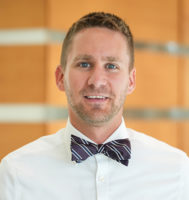Q&A with Jonathan (Jon) Gehlbach, MD, visiting associate professor, Division of Critical Care
 Hometown: Dixon, Illinois
Hometown: Dixon, Illinois
Educational/professional background: After completing my undergraduate degree at the University of North Carolina at Chapel Hill, I returned home to Illinois for medical school at the University of Illinois College of Medicine Peoria. I completed my pediatrics residency and a year as chief resident at the University of Wisconsin. I then completed a fellowship in pediatric critical care medicine at Duke University School of Medicine.
Previous position (title, institution): I was an assistant (then associate) professor of clinical pediatrics at the University of Illinois College of Medicine Peoria, serving as program director for the Pediatric Critical Care Medicine Fellowship. Clinically, I was a pediatric intensivist at the OSF HealthCare Children’s Hospital of Illinois, where I served as medical director of the Pediatric Critical Care Unit.
What is your field of research or area of clinical care, and how did you get into it? My primary interests revolve around patient safety and safety culture, patient/family engagement, and education (especially competency-based medical education).
How would you describe your work to a 5-year-old? I take care of the sickest kids in the hospital whose bodies are struggling to do their jobs.
What attracted you to UW–Madison? Having spent four years here during my training, I had firsthand knowledge of the many wonderful attributes of the Department of Pediatrics, American Family Children’s Hospital, and the amazing people. From a personal standpoint, my wife and I both have family in the Madison area, and with three kids, having family around is a huge advantage. Combining those factors with the opportunity to live in such an amazing city created a dream job situation that was too good to pass up!
What is your favorite thing to do in Madison? There are too many to pick just one: family bike rides, the Dane County Farmer’s Market, finding new parks for our kids to play in, relaxing at the Memorial Union Terrace, enjoying lake activities, attending UW athletics, etc.
What’s one thing you hope trainees will learn from you and your work? We are blessed with the opportunity to care for sick children and should not take for granted the trust our patients’ families put in us to provide the best care possible. We owe it to them to work together, both as a team and with the families, to achieve the best possible outcome.
Do you feel your work relates to the Wisconsin Idea? If so, please describe how. Without a doubt! Teaching is intrinsic to my job as an intensivist, whether it is teaching learners, bedside staff, or families. Even questions about clinical management become teachable moments. For example, if a nurse or family member suggests a different strategy than what I’ve proposed, it’s likely because he/she has a perspective that I’m lacking (an opportunity for me to learn), or vice versa (an opportunity for me to share my decision-making with the rest of the team). This mentality emphasizes the role each of us has not just as teachers, but also as learners.
What’s something interesting about your area of expertise you can share that will make us sound smarter during video chats and parties? One of the medications we use to manage critical asthma (aminophylline) comes from the same class of compounds (methylxanthines) as the most commonly used drug in the world — caffeine. Caffeine itself may help improve airway function and reduce frequency of asthma attacks in people with asthma.
What are some of your hobbies and other interests? Doing whatever activity my kids are into at the moment, such as golfing.